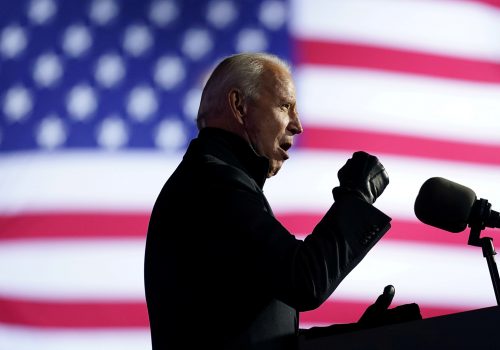FAST THINKING: What Biden’s victory means for America’s allies
Read the full reaction from our experts
JUST IN
Joe Biden has amassed enough votes to become President-elect of the United States, according to the Associated Press, on a platform that included restoring America’s fraying relationships around the world. Here’s what the countries on the other end of those relationships can expect next.
TODAY’S EXPERT REACTION COURTESY OF
- Chris Skaluba: Former US defense official and director of the Atlantic Council’s Transatlantic Security Initiative
- Miyeon Oh: Asia scholar and director of the Atlantic Council’s Asia Security Initiative
- Will Wechsler: Former deputy assistant secretary of defense and director of the Atlantic Council’s Middle East programs
- Emma Ashford: Grand strategist and Atlantic Council resident senior fellow
Early focus on a changed Europe
- Chris anticipates fast-acting relief across the Atlantic: “There are rumors of a NATO summit early in a Biden administration that will signal the preeminence of the transatlantic relationship and rapidly change the tone of the Trump years. Expect a quick effort to put the US-EU relationship on better footing as well.”
- But a victorious Biden will find a Europe changed, and an “old normal” that can’t really be restored: “Europe’s estimation of American leadership has become more cynical, especially after an election that seemed to validate Trump’s perspective as much as it did Biden’s. Parts of the European political and policy establishment want a permanently more independent posture from US policy and can use the closely contested election as ammunition for that purpose. While Biden’s team will undoubtedly demonstrate a sustained commitment to working with Europe on most major issues, repairing the mistrust of US intentions that Trump has cultivated in European capitals will likely take positive relations with successive administrations.”
Asia looking for answers
- Miyeon articulates the questions ricocheting across allied Asian capitals right now: How is an incoming Biden administration “going to identify areas of conflicting versus common interest with China?”
- Here’s why that’s top of mind, she adds: “Given Asia-Pacific allies’ heavy economic reliance on China, as well as China’s more aggressive behavior and narratives since the outbreak of the COVID-19 pandemic, US policy toward China will have significant implications for how these allies re-evaluate and adjust their own China policies and strategies.”
An opportunity for reset in the Middle East
- Will wonders whether a Biden administration will reverse a trend decades in the making. While a number of Middle Eastern powers have “sharply diverged from their traditionally apolitical approach to Washington, preferring instead to increasingly align themselves with the Republican party,” a “new Biden administration provides an opportunity for leaders in the region, particularly the current leaders in Saudi Arabia and Israel, to appreciate the negative consequences of their politicized approach to Washington and to seek to ‘reset’ relations along lines of longstanding common interests, including dealing with threats from Iran.”
- Biden will likely be game for such a reset, Will notes, but will that be true for his counterparts? We’ll have to see “whether leaders like Bibi Netanyahu and Mohamed bin Salman, who chose not to hide their support for President Trump’s reelection, will have the wisdom to meet him there.”
What’s next for Biden’s Republican opposition
- Emma’s here to remind us that with all the focus on what a Biden presidency will mean for America’s role in the world, we shouldn’t forget that Donald Trump, and Trumpism, isn’t going away any time soon—a reality that the close presidential race has made clear: “While the Biden administration may prove a brief respite from these trends, the strength of the Republican showing in the 2020 election suggests they are likely to continue in future Republican administrations.”
- While both the Republican and Democratic parties “increasingly embrace the frame of great-power competition,” she observes, Republicans will continue to focus more on the economic contest between the United States and China and on potential “decoupling” with Beijing. “A post-Trump Republican party is likely to continue to be apathetic about the value of international institutions, and skeptical of the utility of multilateral agreements on topics like climate change and arms control,” Emma adds.
Further reading
Sat, Nov 7, 2020
Joe Biden just won the presidency: What does that mean for America’s role in the world?
Elections 2020 By
Atlantic Council experts weigh in on what the outcome of the 2020 election means for US foreign policy and America’s role in the world.
Wed, Nov 4, 2020
What America’s allies and adversaries will make of the 2020 election
Elections 2020 By William F. Wechsler
Rather than provide an opportunity to “bind up the nation’s wounds” once again, the election has instead clearly confirmed the deep divisions in American society by class, region, race, gender, religion, and culture. No matter who wins the presidency, the result will likely be a nation increasingly focused inward on the implications of these divisions.
Fri, Oct 30, 2020
Democracy at home is the source of American power abroad
Elections 2020 By Peter Engelke, Julian Mueller-Kaler
The United States does have the power to both right its own ship and fully employ its example to good effect around the world, but only if its citizens stay engaged in the hard work of democratic self-governance.
Image: REUTERS/Kevin Lamarque


